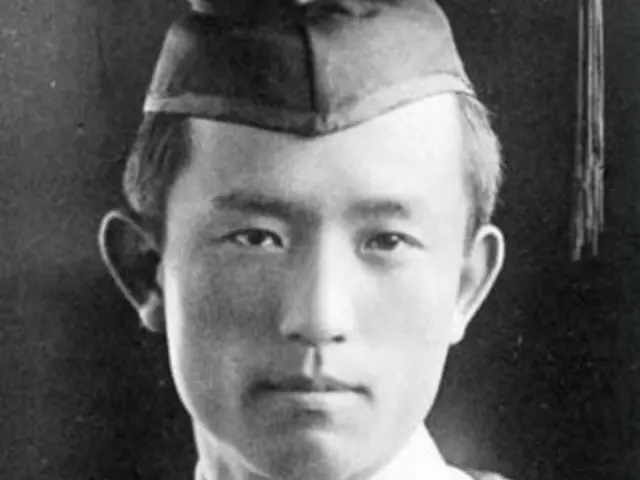According to the Korean newspaper JoongAng Ilbo, the construction of the monument at the university began eight years ago when students who were inspired by Yun's poems began fundraising for its construction, and their feelings were passed on to their juniors and the university.
Yun was born in Jiandao, Manchuria during the Republic of China era. After graduating from Yonhi College (now Yonsei University) in Keijo (now Seoul), he came to Japan in March 1942.
He moved to Rikkyo University and enrolled in the English Literature Department of the Faculty of Letters. He then transferred to Doshisha University, where he also enrolled in the English Literature Department of the Faculty of Letters. During his time at Doshisha University, Yun began writing poems and diaries in Hangul, which led to his involvement in the Korean independence movement.
He was arrested on suspicion of involvement in the movement. However, some have pointed out that this is an exaggeration of some of the charges against him. There were three warrants for his arrest, and he was accused of having "strong Western ideology."
" was said to be the main reason. In February 1944, Yoon was sentenced to two years in prison by the Kyoto District Court for "propagating and inciting ideas banned by the Japanese state." After that,
Yun was imprisoned in Fukuoka Prison and died in prison in February 1945 at the young age of 27. After his death, in 1947, the Korean media Kyunghyang Shinmun reported that Yun had written a novel while he was a student at Rikkyo University.
His work "Easily Written Poems" was introduced, and this led to Yun becoming widely known. In the following year, 1848, he published "Sky, Wind, Stars and Poems," a collection of poems and prose, and became known as a national poet.
Yoon's poems have been translated into Japanese, English, German, French, Chinese, Russian, and other languages.
Yoon's works have been incorporated into Korean nationalist education and are well known among young people.
A literary critic once conducted a survey of Korean people in their twenties, asking them to name their three favorite Korean poets. One of the three named Yun.
Yoon is now so well known in Korea that there is no one who doesn't know him. On the Takahara campus of Kyoto University of Art and Design (now Kyoto University of the Arts), there is the Takeda A-room, where Yoon once lived.
The site of the former "Part-time Job" is now located here. Yoon's uncle, who was visiting the Takeda Apartment while she was living as a boarder, once said, "I was very surprised to see that she was so absorbed in reading that her face was pale.
He was worried about his future. He would forget the cold in his six-tatami room and read, write and think until 2 a.m. It was as if this was his daily task."
A monument to Yun's work "Prologue" was erected within the pass. There is also a monument to the poem at the Imadegawa Campus of Doshisha University, where Yun studied, and the "Yun Dong-ju Memorial Association" and the "Doshisha Korea Alumni Association" are both made up of graduates.
Every year, on the anniversary of Yoon's death (February 16th), the Society holds a flower offering ceremony and a lecture. Until now, Yoon's poetry monuments and memorials have been concentrated in Kyoto, where he had a connection, but recently,
A new monument has been erected at Rikkyo University in Tokyo. The unveiling ceremony was held on the 11th of this month at the Ikebukuro campus. President Rentaro Nishihara said, "After 80 years, poet Yun Dong-ju has returned to Rikkyo University."
Ambassador Lee Hyuk also delivered a speech, saying, "The monument, erected in the year marking 60 years since the normalization of diplomatic relations between Japan and Korea, will not only serve to honor the life and literature of Yun Dong-ju, but also to promote reconciliation and cooperation between the two countries."
"I hope to be a bridge between the two countries," he said. Yoon studied at Rikkyo University for about eight months from April to December 1942. During his time at the university, he left behind five poems, including "Poem Written Easily."
According to the report, students who learned about Yun through a lecture by Professor Li Xiangjin of the University's School of Intercultural Communication and were impressed by him have been working to erect a monument since 2017, the 100th anniversary of his birth.
At a symposium held in the same year, a fundraising campaign was held to raise funds for the construction of the monument, and approximately 700,000 yen was raised. After that, his younger colleagues and the university inherited his spirit, and he has been working to strengthen Japan-Korea relations.
After overcoming the deterioration of his condition and the COVID-19 pandemic, the monument was finally erected recently. The monument features a photograph of Yoon, along with the original text and Japanese translation of "Poem Written Easily."
By scanning the QR code using a smartphone or other device, visitors can learn more about Yoon's life and work as a poet.
2025/10/15 13:25 KST
Copyrights(C)wowkorea.jp 2

